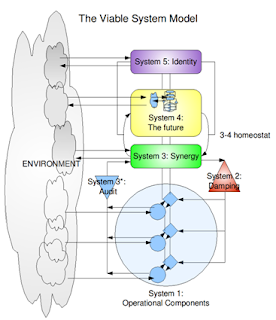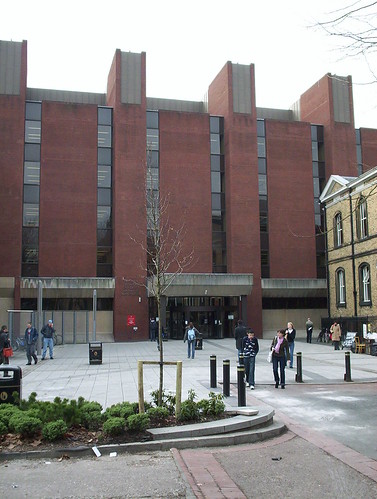One of the principal casualties of the economic crisis is economic theory. (Maybe bad theory is often the root cause of bad things!). The imputation of rationality behind economic behaviour is something that clearly has become highly suspect with the scale of apparently irrational economic decisions made by everyone from home-buyers to hedge-fund managers. With my recent posts about sensuality, I wonder if there's a link to be made between sensual experience, rationality and economics.
In doing this, I might start by relating rationality to communication, and 'irrationality' to sensuality. This may seem a bit of a strong step in the first place... but let's see where it gets us...
1. Rationality and Communication
I think we have to ask how we judge somebody to be rational. As with all judgements, it relies on our making communications with the person we are judging - or at least observing communications they make with other people. In making such judgements, we carry expectations of what we would consider to be 'rational' behaviour. If the behaviour we experience does not satisfy these expectations then we might well consider a person to be irrational. Thus, there is a dimension to rationality which relates directly to the success of communications that a person makes. If utterances made cannot be processed by anyone else, then they will not be successful; they be deemed irrational; but they will still have some sensual import...
2. Irrationality and Sensuality
We wouldn't be surprised if an 'irrational' person responded to sensual stimuli in same way that rational people might. For example, the reaction of what we might deem to be an 'irrational' person to a beautiful sunset may not be that different to that of a "rational" person.
The 'irrational' utterances of a person will still have sensual import... we are sometimes deeply affected by the utterances of "foolish" characters... sometimes they reveal more truth than those 'saner' characters (for example, Lear's fool.. who appears wiser than Lear himself).. but often there is not a discussion to be had.. the issues are too difficult for communication. It's worth noting that Socrates 4 'divine madnesses' are all sensual: telestic madness (madness of ritual), prophetic madness, poetic madness (madness of the muses) and erotic madness.
In an earlier post, I was particularly interested in the triangulation between the topology of the 'landscape of knowledge' and the range of 'moves' that we feel we have available to us at any particular time, and I was thinking about topological game theory as a way of thinking about this.
Now I have a different sort of 'triangulation' with perhaps a bit more definition. The sensual and the rational both focus on the person. The rational is quite explicit in its functioning: utterances must be made, communications need to be successful, meaning must be established, and so. This is a fairly concrete process, although it depends on the state of the individual participating in the communications. The key thing about rational responses is that there is a set process of establishing information (thinking what to say), establishing utterance (thinking how to say it) and interpretation (thinking what was said) in the other person.
In sensual experience, this is not the case. Sensual experience can happen with different parts of the sensory system at any time: we can be shocked, tickled, transformed, love-struck or grief-stricken at any moment without any warning, before we've even had time to think about it. Damasio calls emotion the 'fast route' of cognition, and I think this fits with our experience.
The point about these two things going on is that there is one perceiving system, but it is stimulated by two quite different methods, and both those methods are present at the same time.
So that's perception. What about wealth, possession, power? I think these things are sensory impulses resulting from individual states of those who exhibit the desire for them. Why does this arise in some people? Why do bankers and city traders behave in this way and others are less inclined to? Because they can? I think the answer has to do with knowledge and the forms that knowledge takes.
Knowledge is a type of communicative performance which results (partly) in a domain of rational communications. There are sensual aspects to these performances (which I have refered to as the different forms of knowledge) but basically, knowledge communications depend on reproduction by individuals whose psychic states can process the communications in ways that are understandable by others around them. There may be something about these communications concerning what they do to individual psychic states that gives rise to the sensory impulses that then lead to social pathology. In this way, it's not so different from terrorist cells or drug addicts:
When we look at things like this, we begin to see that private property and the concept of 'ownership' is not a 'property' of a thing, but rather a dynamic process, which has a social trajectory. Understanding the mechanisms of the process may be the first step to intervening with it and doing something about terrible disenfranchisement which is going on at the moment with the economic crisis.
In doing this, I might start by relating rationality to communication, and 'irrationality' to sensuality. This may seem a bit of a strong step in the first place... but let's see where it gets us...
1. Rationality and Communication
I think we have to ask how we judge somebody to be rational. As with all judgements, it relies on our making communications with the person we are judging - or at least observing communications they make with other people. In making such judgements, we carry expectations of what we would consider to be 'rational' behaviour. If the behaviour we experience does not satisfy these expectations then we might well consider a person to be irrational. Thus, there is a dimension to rationality which relates directly to the success of communications that a person makes. If utterances made cannot be processed by anyone else, then they will not be successful; they be deemed irrational; but they will still have some sensual import...
2. Irrationality and Sensuality
We wouldn't be surprised if an 'irrational' person responded to sensual stimuli in same way that rational people might. For example, the reaction of what we might deem to be an 'irrational' person to a beautiful sunset may not be that different to that of a "rational" person.
The 'irrational' utterances of a person will still have sensual import... we are sometimes deeply affected by the utterances of "foolish" characters... sometimes they reveal more truth than those 'saner' characters (for example, Lear's fool.. who appears wiser than Lear himself).. but often there is not a discussion to be had.. the issues are too difficult for communication. It's worth noting that Socrates 4 'divine madnesses' are all sensual: telestic madness (madness of ritual), prophetic madness, poetic madness (madness of the muses) and erotic madness.
In an earlier post, I was particularly interested in the triangulation between the topology of the 'landscape of knowledge' and the range of 'moves' that we feel we have available to us at any particular time, and I was thinking about topological game theory as a way of thinking about this.
Now I have a different sort of 'triangulation' with perhaps a bit more definition. The sensual and the rational both focus on the person. The rational is quite explicit in its functioning: utterances must be made, communications need to be successful, meaning must be established, and so. This is a fairly concrete process, although it depends on the state of the individual participating in the communications. The key thing about rational responses is that there is a set process of establishing information (thinking what to say), establishing utterance (thinking how to say it) and interpretation (thinking what was said) in the other person.
In sensual experience, this is not the case. Sensual experience can happen with different parts of the sensory system at any time: we can be shocked, tickled, transformed, love-struck or grief-stricken at any moment without any warning, before we've even had time to think about it. Damasio calls emotion the 'fast route' of cognition, and I think this fits with our experience.
The point about these two things going on is that there is one perceiving system, but it is stimulated by two quite different methods, and both those methods are present at the same time.
So that's perception. What about wealth, possession, power? I think these things are sensory impulses resulting from individual states of those who exhibit the desire for them. Why does this arise in some people? Why do bankers and city traders behave in this way and others are less inclined to? Because they can? I think the answer has to do with knowledge and the forms that knowledge takes.
Knowledge is a type of communicative performance which results (partly) in a domain of rational communications. There are sensual aspects to these performances (which I have refered to as the different forms of knowledge) but basically, knowledge communications depend on reproduction by individuals whose psychic states can process the communications in ways that are understandable by others around them. There may be something about these communications concerning what they do to individual psychic states that gives rise to the sensory impulses that then lead to social pathology. In this way, it's not so different from terrorist cells or drug addicts:
Patterns of communication ->
the need to rebalance individual viability via sensory stimulation ->
pathological social states which further support and legitimise patterns of communication.
...and so on...When we look at things like this, we begin to see that private property and the concept of 'ownership' is not a 'property' of a thing, but rather a dynamic process, which has a social trajectory. Understanding the mechanisms of the process may be the first step to intervening with it and doing something about terrible disenfranchisement which is going on at the moment with the economic crisis.







